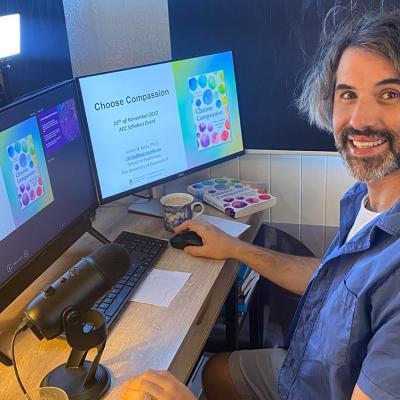Imagine a career where you get to help people reclaim their lives and build resilience as they face some of life’s toughest health challenges. That’s the world of health psychology.
Health psychologists work with patients coping with chronic illnesses, injuries, and life-changing health diagnoses. They take a whole-person approach, guiding patients through complex emotions, helping them rediscover their sense of self, and building psychological strength.
We recently spoke with T’Keya Chambers, graduate of the UQ Master of Psychology (Health Psychology) program, to gain insight into her career and the impact of health psychologists.
T’Keya, who works in spinal injury rehabilitation, shared how she helps hospital patients navigate life-altering changes, such as facing the possibility of never walking again. If you’re passionate about supporting others through health challenges, this could be the perfect career for you.
What does a health psychologist do?
Health psychology, or psychology in health care, is a specialised field that focuses on how psychological factors influence physical health and wellbeing. Health psychologists work with individuals who are coping with chronic illnesses, injuries, or significant health challenges, helping them navigate the emotional and psychological aspects of their journey.
Think of a health psychologist as a guide, offering support to help people adapt to life changes, build resilience, and maintain psychological wellbeing while managing physical health conditions.
Health psychologists, regardless of their specific work setting, are skilled at:
- understanding the complex relationship between physical health and psychological wellbeing, and addressing how one impacts the other
- conducting assessments to identify psychological, emotional and behavioural factors that influence health outcomes
- designing and implementing interventions to promote healthy behaviours and improve overall wellbeing
- educating individuals and groups about the psychological aspects of health and illness to encourage informed decision-making
- supporting individuals in managing stress, developing coping strategies, and fostering resilience to improve their quality of life
- collaborating with healthcare teams, educators and communities to develop programs that address public health challenges
- using research and evidence-based practices to inform strategies for preventing illness and enhancing health at both individual and population levels.
T’Keya works as a health psychologist in an inpatient hospital setting, where she helps patients adjust to life after a spinal injury, guiding them through the emotional stages of their recovery.
“People are learning they may never walk again,” she says.
“A huge part of my role is helping them process grief and loss and supporting them as they build emotional resilience for their rehabilitation journey.”
For T’Keya, health psychology is about being adaptable and meeting patients where they are.
“We focus on the person, not just the illness or disease,” she says.
“We work together to help them be their best self through their illness, not just in spite of it, and every patient’s journey is unique.”
By offering tailored support and empowering patients to manage both their mental and physical health, health psychologists play a key role in helping individuals lead fulfilling lives despite their health challenges.
Where do health psychologists work?
Health psychologists play an important role across various settings where physical health challenges intersect with emotional wellbeing. They often work in environments where patients face long-term or chronic health issues, such as:
- Hospitals and medical centres: Often working in interprofessional health teams, health psychologists support patients with chronic health issues, such as recovery from severe injuries or managing long-term conditions.
- Rehabilitation centres: In these settings, health psychologists provide psychological support to people recovering from injury, surgery, or managing long-term health conditions.
- Private practices: Many health psychologists operate in private settings, offering individual consultations to clients managing chronic health conditions or life changes. A health psychology lens can also benefit clients with mental health conditions such as anxiety and depression.
- Research institutions and universities: Some health psychologists contribute to research exploring the psychological effects of illness, injury, and treatment, helping to shape evidence-based practices.
- Community health organisations: Health psychologists may also work in public health roles, focusing on mental health promotion and the integration of psychological care in community-based health initiatives.
In each of these settings, health psychologists like T'Keya are committed to helping patients build resilience, adjust to new realities, and achieve a meaningful quality of life despite their health challenges.
Why study health psychology?
T'Keya believes that health psychology offers a deeply rewarding career for those passionate about helping people navigate health challenges while also making a meaningful impact on their lives. For her, this passion began when a guest lecturer introduced her to the field of health psychology during her undergraduate course.
"It never started directly with the idea of becoming a health psychologist," she says.
"But something clicked when I learned more about the role, and I wrote it down in my journal. I didn’t know it then, but that was the beginning of my path."
T'Keya's interest in chronic illness and health psychology was further solidified after watching Lady Gaga’s documentary Five Foot Two, which highlighted the singer’s struggle with fibromyalgia.
"That was when I knew I wanted to become a psychologist in the field of chronic disease," says T'Keya, adding that films like Cake and Love and Other Drugs further deepened her understanding of the emotional complexities surrounding chronic conditions.

Benefits of a career in health psychology
- Holistic approach: Health psychologists focus on the whole person, integrating emotional, psychological, spiritual, cultural and physical wellbeing to help patients cope and thrive despite health challenges.
- Emotional resilience: In this field, you'll work on building emotional strength and psychological flexibility, guiding individuals through significant life changes.
- Diverse work environments: Health psychologists can find opportunities across hospitals, rehabilitation centres, private practices, and more, often collaborating with medical professionals in multidisciplinary teams.
- Fulfilling impact: Few careers offer the level of personal satisfaction that comes from supporting individuals during their most difficult moments and helping them find hope and resilience.
- Increasing demand: The growing recognition of the connection between mental and physical health is driving an increased demand for health psychologists. Their expertise is essential in addressing how psychological wellbeing impacts physical health outcomes and vice versa.
How much do health psychologists make in Australia?
A career in health psychology offers competitive earning potential, especially as the demand for mental health professionals in health settings continues to rise.
According to Glassdoor, the average salary for a health psychologist in Queensland ranges from $85,000 to $120,000 per year, depending on experience and location.
Advice for future health psychologists
T'Keya offers some invaluable advice for those considering a career in health psychology.
"Approach your studies with an open mind," she says.
"Health psychology is all about understanding the whole person, and that requires being open to learning about different life stories, challenges, and emotional journeys."
She encourages students to dive deep into the practical side of the profession, recommending they explore media content that provides real-life insight.
"Watch documentaries, read books, or check out YouTube vlogs like Daily Vlog: Chemotherapy. It’s a great way to really get a sense of what the work is like and whether it resonates with you."
T'Keya also stresses the importance of figuring out what you don't like early on.
"It’s just as important to know what doesn’t resonate with you," she says.
"Research different psychology fields and roles, like forensic or clinical psychology, to see if health psychology feels like the right fit."
She also encourages future health psychologists to actively engage and connect with their peers and mentors.
"Ask questions and make connections early," she says.
"University is a great place to form these relationships that will help guide you on your professional journey."
Finally, T'Keya reminds students to embrace their individuality.
"Don’t hide your unique qualities. As a black female psychologist, celebrating my uniqueness has led to a lot of opportunities. Be proud of who you are."
How to become a health psychologist
If you’re considering becoming a health psychologist in Australia, it's important to choose from the best health psychology master's programs that offer specialised training in areas like chronic illness management, rehabilitation, and emotional resilience.
At UQ, the Master of Psychology (Health Psychology) program provides a comprehensive understanding of psychological theories and practical skills tailored to the healthcare context. This ensures you're well-prepared to apply your expertise in real-world healthcare settings.
Before commencing a health psychology postgraduate program, you’ll need to complete an accredited 4-year psychology degree such as:






